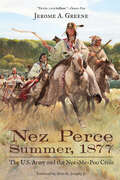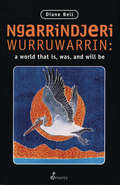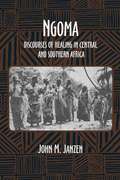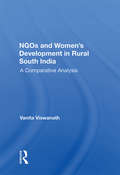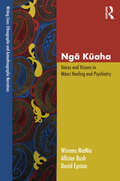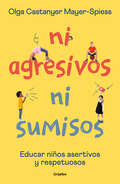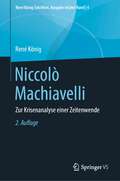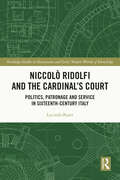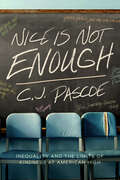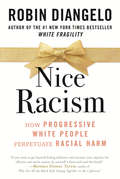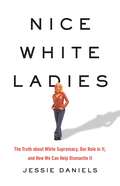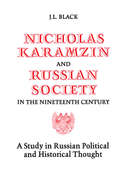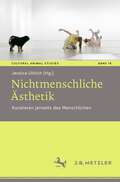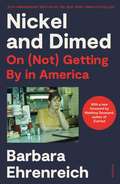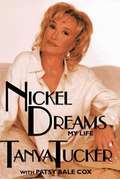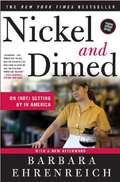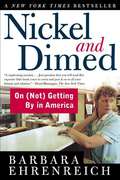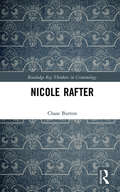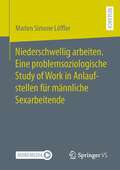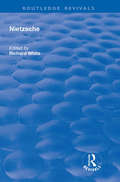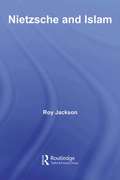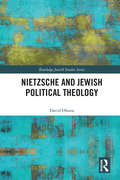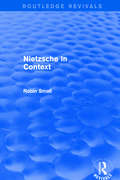- Table View
- List View
Nez Perce Summer, 1877: The U.S. Army and the Nee-Me-Poo Crisis
by Jerome A. GreeneNez Perce Summer, 1877 tells the story of a people&’s epic struggle to survive spiritually, culturally, and physically in the face of unrelenting military force. Written by one of the foremost experts in frontier military history, Jerome A. Greene, and reviewed by members of the Nez Perce tribe, this definitive treatment of the Nez Perce War is the first to incorporate research from all known accounts of Nez Perce and U.S. military participants. Enhanced by sixteen detailed maps and forty-nine historic photographs, Greene&’s gripping narrative takes readers on a three-and-one-half month 1,700-mile journey across the wilds of Idaho, Wyoming, and Montana territories. All of the skirmishes and battles of the war receive detailed treatment, which benefits from Greene&’s astute analysis of the strategies and decision making on both sides. Between 100 and 150 of the more than 800 Nez Perce men, women, and children who began the trek were killed during the war. Almost as many died in the months following the surrender, after they were exiled to malaria-ridden northeastern Oklahoma. Army deaths numbered 113. The casualties on both sides were an extraordinary price for a war that nobody wanted but whose history has since fascinated generations of Americans.
Ngarrindjeri Wurruwarrin
by Diane BellThis finely textured ethnography weaves written texts with the voices of women and men who struggle to protect their sacred sites. It provides a deeper understanding of lives profoundly affected by two centuries of colonization.
Ngoma: Discourses of Healing in Central and Southern Africa
by John M. JanzenNgoma,in Bantu, means drum, song, performance, and healing cult or association. A widespread form of ritual healing in Central and Southern Africa, ngoma is fully investigated here for the first time and interpreted in a contemporary context. John Janzen's daring study incorporates drumming and spirit possession into a broader, institutional profile that emphasizes the varieties of knowledge and social forms and also the common elements of "doing ngoma." Drawing on his recent field research in Kinshasa, Dar-es-Salaam, Mbabane, and Capetown, Janzen reveals how ngoma transcends national and social boundaries. Spoken and sung discourses about affliction, extended counseling, reorientation of the self or household, and the creation of networks that link the afflicted, their kin, and their healers are all central to ngoma--and familiar to Western self-help institutions as well. Students of African healing and also those interested in the comparative and historical study of medicine, religion, and music will find Ngomaa valuable and thought-provoking book.
Ngos And Women's Development In Rural South India: A Comparative Analysis
by Vanita ViswanathIn recent years scholars have paid increasing attention to the role of women in development and to non-governmental organizations (NGOs) as effective vehicles for change. Although there are a great many published studies dealing with each of these subjects separately there are few on NGOs and their work with women. Studies that combine a theoreti
Ngā Kūaha: Voices and Visions in Māori Healing and Psychiatry (ISSN)
by David Epston Wiremu NiaNia Allister BushNgā Kūaha: Voices and Visions in Māori Healing and Psychiatry explores what it means to hear voices and see visions from the perspectives of Māori healer Wiremu NiaNia and psychiatrist Allister Bush. Wiremu explains Ngā Kūaha as referring to doorways and offers entranceways into Māori knowledge about wairua (spirituality) handed down by his forebears and other Māori sources.The authors provide historical examples of Western mystical experiences and contrasting Western psychiatric and psychological explanations of voices and visions as hallucinations. Further chapters focus on narratives and perspectives from people who have experienced voices and visions, and have had interactions with mental health services, told from multiple viewpoints; individual, whānau (family), Māori healing and psychiatry. The benefits of joint Māori healing and psychiatry approaches on wellbeing are examined. Drawing on their 18-year partnership, Wiremu and Allister highlight the harmful colonial impact of psychiatry in suppressing Māori views of voices and visions. They describe ways of working together in clinical practice to address this history of injustice and how to identify whether distressing perceptual experiences may represent Māori cultural experiences, psychiatric or psychological symptoms or all of these. This book advocates for practices that enable genuine partnerships between Māori healers, other wairua practitioners and mental health clinicians in order to improve the mental health and spiritual care of Māori and perhaps other peoples.
Ni agresivos ni sumisos: Educar en la asertividad y el respeto
by Olga Castanyer Mayer-SpiessUn manual de instrucciones para comprender a nuestros niños y educarlos para que desarrollen una autoestima sana y se conviertan en adultos asertivos. Conoce a María, Olaya, Carlos y Óscar, la Banda del Moco; cuatro niños a los que seguiremos, junto con sus padres y profesores, en su proceso de aprender a afrontar una situación de abuso en la escuela. Olga Castanyer, reconocida psicóloga experta en autoestima y asertividad, analiza en este libro diferentes alternativas para gestionar las situaciones conflictivas desde la familia y la escuela y señala la importancia del ejemplo, el refuerzo, los límites y el amor incondicional. Enseña, además, pautas que ayudarán a padres y a profesores a educar en la autoestima y la asertividad.
Niccolò Machiavelli: Zur Krisenanalyse einer Zeitenwende (René König Schriften. Ausgabe letzter Hand #4)
by René KönigRené König verfasste sein Buch über Machiavelli in einer Lebensphase, die ihm selbst als persönliche und epochale Zeitenwende erschien. Erstmals 1941 in der schweizerischen Emigration veröffentlicht, bietet das Werk in historischem Gewand eine Auseinandersetzung mit Problemen der Politik und Konstellationen der Macht, die Schlaglichter auch auf die aktuelle Situation Europas in jenen Jahren wirft. Die Durchleuchtung der nicht nur für die Zeit Machiavellis charakteristischen Brüche zwischen politischer Theorie und nachfolgender Praxis nutzt König überdies, um seine eigene Überzeugung von der Notwendigkeit eines aufklärerischen Humanismus der Mitte durchscheinen zu lassen.
Niccolò Ridolfi and the Cardinal's Court: Politics, Patronage and Service in Sixteenth-Century Italy (Routledge Studies in Renaissance and Early Modern Worlds of Knowledge)
by Lucinda ByattNiccolò Ridolfi (1501–50), was a Florentine cardinal, nephew and cousin to the Medici popes Leo X and Clement VII, and he owed his status and wealth to their patronage. He remained actively engaged in Florentine politics, above all during the years of crisis that saw the Florentine state change from republic to duchy. A widely respected patron and scholar throughout his life, his sudden death during the conclave of 1549–50 led to allegations of poison that an autopsy appears to confirm. This book examines Cardinal Ridolfi and his court in order to understand the extent to which cardinalate courts played a key part in Rome’s resurgence and acted as hubs of knowledge located on the fault lines of politics and reform in church and state, hospitable spaces that can be analysed in the context of entanglements in Florentine and Roman cultural and political patronage, and intersections between the princely court and a more professional and complex knowledge and practice of household management in the consumer and service economy of early modern Rome. Based on an array of archival sources and on three treatises whose authors were closely linked to Ridolfi’s court, this monograph explores these multidisciplinary intersections to allow the more traditional fields of church and political history to be approached from different angles. Niccolò Ridolfi and the Cardinal's Court will appeal to all those interested in the organisation of these elite establishments and their place in sixteenth-century Roman society, the life and patronage of Niccolò Ridolfi in the context of the Florentine exiles who desired a return to republicanism, and the history of the Roman Catholic Church.
Niccolò Ridolfi and the Cardinal's Court: Politics, Patronage and Service in Sixteenth-Century Italy (Routledge Studies in Renaissance and Early Modern Worlds of Knowledge)
by Lucinda ByattNiccolò Ridolfi (1501–50), was a Florentine cardinal, nephew and cousin to the Medici popes Leo X and Clement VII, and he owed his status and wealth to their patronage. He remained actively engaged in Florentine politics, above all during the years of crisis that saw the Florentine state change from republic to duchy. A widely respected patron and scholar throughout his life, his sudden death during the conclave of 1549–50 led to allegations of poison that an autopsy appears to confirm.This book examines Cardinal Ridolfi and his court in order to understand the extent to which cardinalate courts played a key part in Rome’s resurgence and acted as hubs of knowledge located on the fault lines of politics and reform in church and state, hospitable spaces that can be analysed in the context of entanglements in Florentine and Roman cultural and political patronage, and intersections between the princely court and a more professional and complex knowledge and practice of household management in the consumer and service economy of early modern Rome. Based on an array of archival sources and on three treatises whose authors were closely linked to Ridolfi’s court, this monograph explores these multidisciplinary intersections to allow the more traditional fields of church and political history to be approached from different angles.Niccolò Ridolfi and the Cardinal's Court will appeal to all those interested in the organisation of these elite establishments and their place in sixteenth-century Roman society, the life and patronage of Niccolò Ridolfi in the context of the Florentine exiles who desired a return to republicanism, and the history of the Roman Catholic Church.
Nice Is Not Enough: Inequality and the Limits of Kindness at American High
by C. J. PascoeThis provocative story of contemporary high school argues that a shallow culture of kindness can do more lasting harm than good. Based on two years of research, Nice Is Not Enough shares striking dispatches from one high school's "regime of kindness" to underline how the culture operates as a Band-Aid on persistent inequalities. Through incisive storytelling and thoughtful engagement with students, this brilliant study by C.J. Pascoe exposes uncomfortable truths about American politics and our reliance on individual solutions instead of profound systemic change. Nice Is Not Enough brings readers into American High, a middle- and working-class high school characterized by acceptance, connection, and kindness—a place where, a prominent sign states, "there is no room for hate." Here, inequality is narrowly understood as a problem of individual merit, meanness, effort, or emotion rather than a structural issue requiring deeper intervention. Surface-level sensitivity allows American High to avoid "political" topics related to social inequality based on race, sex, gender, or class. Being nice to each other, Pascoe reveals, does not serve these students or solve the broader issues we face; however, a true politics of care just might.
Nice Racism: How Progressive White People Perpetuate Racial Harm
by Robin DiAngeloBuilding on the groundwork laid in the New York Times bestseller White Fragility, Robin DiAngelo explores how a culture of niceness inadvertently promotes racism.In White Fragility, Robin DiAngelo explained how racism is a system into which all white people are socialized and challenged the belief that racism is a simple matter of good people versus bad. DiAngelo also made a provocative claim: white progressives cause the most daily harm to people of color. In Nice Racism, her follow-up work, she explains how they do so. Drawing on her background as a sociologist and over 25 years working as an anti-racist educator, she picks up where White Fragility left off and moves the conversation forward.Writing directly to white people as a white person, DiAngelo identifies many common white racial patterns and breaks down how well-intentioned white people unknowingly perpetuate racial harm. These patterns include:-rushing to prove that we are &“not racist&”;-downplaying white advantage;-romanticizing Black, Indigenous and other peoples of color (BIPOC);-pretending white segregation &“just happens&”;-expecting BIPOC people to teach us about racism;-carefulness;-and feeling immobilized by shame.DiAngelo explains how spiritual white progressives seeking community by co-opting Indigenous and other groups&’ rituals create separation, not connection. She challenges the ideology of individualism and explains why it is OK to generalize about white people, and she demonstrates how white people who experience other oppressions still benefit from systemic racism. Writing candidly about her own missteps and struggles, she models a path forward, encouraging white readers to continually face their complicity and embrace courage, lifelong commitment, and accountability.Nice Racism is an essential work for any white person who recognizes the existence of systemic racism and white supremacy and wants to take steps to align their values with their actual practice. BIPOC readers may also find the &“insiders&” perspective useful for navigating whiteness.Includes a study guide.
Nice White Ladies: The Truth about White Supremacy, Our Role in It, and How We Can Help Dismantle It
by Jessie DanielsAn acclaimed expert illuminates the distinctive role that white women play in perpetuating racism, and how they can work to fight it In a nation deeply divided by race, the &“Karens&” of the world are easy to villainize. But in Nice White Ladies, Jessie Daniels addresses the unintended complicity of even well-meaning white women. She reveals how their everyday choices harm communities of color. White mothers, still expected to be the primary parents, too often uncritically choose to send their kids to the &“best&” schools, collectively leading to a return to segregation. She addresses a feminism that pushes women of color aside, and a wellness industry that insulates white women in a bubble of their own privilege. Daniels then charts a better path forward. She looks to the white women who fight neo-Nazis online and in the streets, and who challenge all-white spaces from workplaces to schools to neighborhoods. In the end, she shows how her fellow white women can work toward true equality for all.
Nicholas Karamzin and Russian Society in the Nineteenth Century
by J. Laurence BlackNicholas Karamzin (1766-1826) was a remarkably active thinker and writer during a time that was trying to all Europeans. A first-hand witness to the French Revolution, Napoleonic suzerainty over Europe, the burning of Moscow, and the Decembrist revolt in St. Petersburg, he presented in his voluminous correspondence and published writings a world view that recognized the weaknesses of the Russian Empire and at the same time foresaw the dangers of both radical change and rigid autocracy. Russian conservatism owes much to this man, even though he would have agreed with very few of those who came after him and were called conservative: he supported autocracy, but was committed to enlightenment; he abhorred constitutions. The fact that his writing had lasting significance has rarely been challenged, but the social and political nature of that contribution has never before been demonstrated. Previous studies of Karamzin have dealt with his literary career. This monograph focuses on the final third of his life, on his career at court (1816-26) and on the cultural heritage he left to the Russian Empire. As the historian of Russia most widely read by his and later generations, his historical interpretations mirrored and helped shape the image Russians had of themselves. Professor Black's study of Karamzin is crucial to any examination of Russia's enlightenment, conservatism, historical writing, and national self-consciousness.
Nichtmenschliche Ästhetik: Kuratieren jenseits des Menschlichen (Cultural Animal Studies #18)
by Jessica UllrichDer Band verbindet aktuelle Diskurse um nichtmenschliche oder mehr-als-menschliche Akteure in ästhetischen Prozessen mit der derzeit virulenten Debatte um „Care“ bzw. Fürsorgeethik in der Kunst. Gefragt wird nach den Bedingungen, Modi und Konsequenzen einer nichtmenschlichen Ästhetik und danach, in welcher Form Tiere, Pflanzen, Pilze, Mikroben, Bakterien, Maschinen oder künstliche Intelligenzen im Rahmen von Kunstwerken handeln. Die Beiträge beleuchten, wie Künstler*innen mit nichtmenschlichen Entitäten im Rahmen von performativen oder installativen Kunstwerken interagieren und wie sie füreinander sorgen und füreinander verantwortlich sind.
Nickel And Dimed (20th Anniversary Edition): On (not) Getting By In America
by Barbara EhrenreichTwenty years ago, Barbara Ehrenreich published a book that did not describe the lived realities of working poverty so much as imprint them somewhere deep in your conscience. The daughter of a copper miner turned journalist, Ehrenreich tem¬porarily left her normal, middle-class life to work in the low- wage labor market. The Clinton administration had recently reformed cash welfare, pushing millions of families off public aid and into the workforce. Members of both political parties were preaching work as the solution to poverty. Ehrenreich set out to see if they were right. In his journals, Nietzsche implored us to “experience the great problems with one’s body and one’s soul.” Well, here was a great problem—unacceptable levels of scarcity and hunger in one of the richest democracies in the history of the world—and Ehrenreich tossed herself into it.
Nickel and Dimed
by Barbara Ehrenreich Frances Fox PivenAcclaimed as an instant classic upon publication, "Nickel and Dimed" has sold more than 1. 5 million copies and become a staple of classroom reading. Chosen for "one book" initiatives across the country, it has fueled nationwide campaigns for a living wage. Funny, poignant, and passionate, this revelatory firsthand account of life in low-wage America--the story of Barbara Ehrenreich's attempts to eke out a living while working as a waitress, hotel maid, house cleaner, nursing-home aide, and Wal-Mart associate--has become an essential part of the nation's political discourse. Now, in a new afterword, Ehrenreich shows that the plight of the underpaid has in no way eased: with fewer jobs available, deteriorating work conditions, and no pay increase in sight, "Nickel and Dimed" is more relevant than ever.
Nickel and Dimed: On (Not) Getting By in America
by Barbara Ehrenreich Frances Fox PivenThe New York Times bestseller, and one of the most talked about books of the year, Nickel and Dimed has already become a classic of undercover reportage.<P><P> Millions of Americans work for poverty-level wages, and one day Barbara Ehrenreich decided to join them. She was inspired in part by the rhetoric surrounding welfare reform, which promised that any job equals a better life. But how can anyone survive, let alone prosper, on $6 to $7 an hour? To find out, Ehrenreich moved from Florida to Maine to Minnesota, taking the cheapest lodgings available and accepting work as a waitress, hotel maid, house cleaner, nursing-home aide, and Wal-Mart salesperson. She soon discovered that even the "lowliest" occupations require exhausting mental and physical efforts. And one job is not enough; you need at least two if you intend to live indoors.<P> Nickel and Dimed reveals low-wage America in all its tenacity, anxiety, and surprising generosity -- a land of Big Boxes, fast food, and a thousand desperate strategies for survival. Instantly acclaimed for its insight, humor, and passion, this book is changing the way America perceives its working poor.
Nicole Rafter (Routledge Key Thinkers in Criminology)
by Chase BurtonThis book is a critical summary and exegesis of the work of Nicole Rafter, who was a leading scholar of the history of biological theories of crime causation as well as a profound theorist of the role of history within criminology. It introduces Rafter’s key works and assesses her contributions to the fields of feminist criminology, cultural criminology, visual criminology and historical criminology. It also explores her theorization of criminology’s identity, scientific status, and possible futures. While many books on criminological theory explain and historically contextualize theory, they do not interrogate the production of theory or the epistemological assumptions behind it. Drawing on the world of Nicole Rafter, this book offers an accessible handbook to her extensive historical studies and to how her work demonstrated the importance of historical theory to criminological knowledge. Furthermore, the author brings Rafter’s historical research to life and shows how it speaks to contemporary issues in criminology and punishment. Written in a clear and direct style, this book will appeal to students and scholars of criminological theory, intellectual history, sociology, comparative criminology, and feminist criminology.
Niederschwellig arbeiten. Eine problemsoziologische Study of Work in Anlaufstellen für männliche Sexarbeitende
by Marlen Simone LöfflerWie erreicht man Menschen, denen aus Sicht der Gesellschaft unbedingt geholfen werden sollte, die aber selbst keine Hilfe anfordern? Dieser Frage geht Marlen S. Löffler in ihrer ethnomethodologischen Ethnographie in niederschwelligen Anlauf- und Beratungsstellen für männliche Sexarbeitende nach. Auf der Basis einer problemsoziologischen und ethnomethodologischen Study of Work zeigt sie, wie Sozialarbeitende Niederschwelligkeit bewerkstelligen und inwiefern die diskursive Hervorbringung der Problemkategorie „männlicher Sexarbeitender“ an die Praktiken der Niederschwelligkeit gekoppelt ist. Der Band trägt zum grundlegenden Verständnis niederschwelliger Sozialer Arbeit und zu einer kritischen Auseinandersetzung mit problemsoziologischen Ansätzen bei.
Nietzsche (Routledge Revivals)
by Richard WhiteThis title was first published in 2002: Nietzsche described himself as a godless anti-metaphysician. These writings encourage the student to question any reading that fails to address Nietzsche's sense of irony with respect to his own philosophical claims. The anthology includes the best recent writings on Nietzsche. It covers all the main themes of Nietzsche's philosophy and pays particular attention to Nietzsche's discussion of value and the need for a re-evaluation of values; his critique of metaphysics and the problem of knowledge; and his account of art and politics.
Nietzsche and Islam (Routledge Advances in Middle East and Islamic Studies #Vol. 11)
by Roy JacksonIn the light of current events, particularly the ‘post September 11th’ debates with much focus on aspects of the ‘clash of civilisation’ thesis, the issue of Islamic identity is a crucial one. Whilst Friedrich Nietzsche was addressing an audience of a different culture and age, his own originality, creativity, psychological, philological and historical insights allows for a fresh and enlightening understanding of Islam within the context of our modern era. In this book, Roy Jackson sets out to determine: Why did Nietzsche feel inclined to be so generous towards the Islamic tradition yet so critical of Western Christianity? How important was religion for Nietzsche’s views on such matters as moral and political philosophy and how does this help us to understand the Islamic response to modernity? How does Nietzsche’s distinctive outlook and methodology help us to understand such key Islamic paradigms as the Qur’an, the Prophet, and the ‘Rightly-Guided’ Caliphs? Nietzsche and Islam provides an original and fresh insight into Nietzsche’s views on religion and shows that his philosophy can make an important contribution to what is considered to be Islam’s key paradigms. As such it will be of interest to a diverse readership and will provide useful material for researchers when thinking about religion, Islam and the future.
Nietzsche and Jewish Political Theology (Routledge Jewish Studies Series)
by David OhanaNietzsche and Jewish Political Theology is the first book to explore the impact of Friedrich Nietzsche’s work on the formation of Jewish political theology during the first half of the twentieth century. It maps the many ways in which early Jewish thinkers grappled with Nietzsche’s powerful ideas about politics, morality, and religion in the process of forging a new and modern Jewish culture. The book explores the stories of some of the most important Jewish thinkers who utilized Nietzsche’s writings in crafting the intellectual foundations of Jewish modern political theology. These figures’ political convictions ranged from orthodox conservatism to pacifist anarchism, and their attitude towards Nietzsche’s ideas varied from enthusiastic embrace to ambivalence and outright rejection. By bringing these diverse figures together, the book makes a convincing argument about Nietzsche’s importance for key figures of early Zionism and modern Jewish political thought. The present study offers a new interpretation of a particular theological position which is called "heretical religiosity." Only with modernity and, paradoxically, with rapid secularization, did one find "heretical religiosity" at full strength. Nietzsche enabled intellectual Jews to transform the foundation of their political existence. It provides a new perspective on the adaptation of Nietzsche’s philosophy in the age of Jewish national politics, and at the same time is a case study in the intellectual history of the modern Jewry. This new reading on Nietzsche’s work is a valuable resource for students and researchers interested in philosophy, Jewish history and political theology.
Nietzsche in Context
by Robin SmallThis title was first published in 2001. Friedrich Nietzsche has always been recognized as an original thinker, one who stands apart from and outside the philosophical schools and tendencies of his time. This is the way he continually presented himself. Many readers have accepted this self-interpretation at face value. Yet there is another side to Nietzsche's thinking which shows not only an awareness of contemporary writers, but an engagement with their ideas which is often both intense and sustained. The intention of this study is to explore this side in detail, by surveying various themes in his philosophical thinking with such links in mind. It is important to avoid one misunderstanding though: this book is not designed to show that Nietzsche derived his ideas from various other thinkers. In that sense, it is not necessarily about "sources" or even about "influences". Rather, it shows that his independence and originality developed in dialogue with other thinkers.
Nietzsche's Culture of Humanity
by Jeffrey ChurchNietzsche scholars have long been divided over whether Nietzsche is an aristocratic or a democratic thinker. Nietzche's Culture of Humanity overcomes this debate by proving both sides wrong. Jeffrey Church argues that in his early period writings, Nietzsche envisioned a cultural meritocracy that drew on the classical German tradition of Kant and Herder. The young Nietzsche's 'culture of humanity' synthesized the high and low, the genius and the people, the nation and humanity. Nietzsche's early ideal of culture can shed light on his mature period thought, since, Church argues, Nietzsche does not abandon this fundamental commitment to a cultural meritocracy. Nietzche's Culture of Humanity argues that Nietzsche's novel defense of culture can overcome some persisting problems in contemporary liberal theories of culture. As such, this book should interest Nietzsche scholars, political theorists and philosophers interested in modern thought, as well as contemporary thinkers concerned with the politics of culture.
